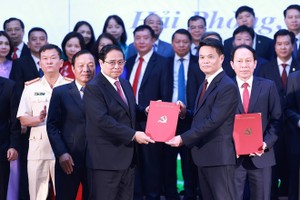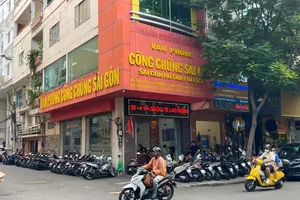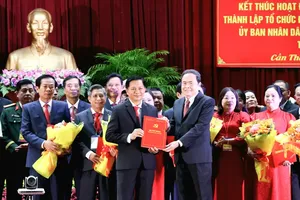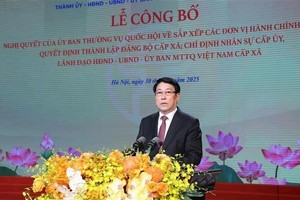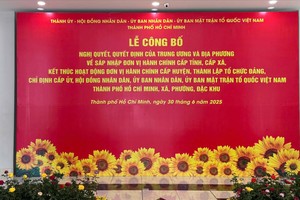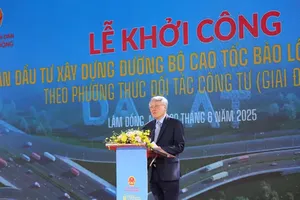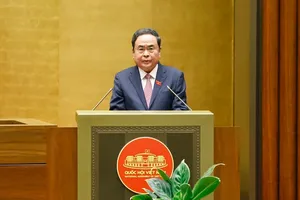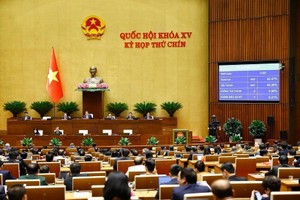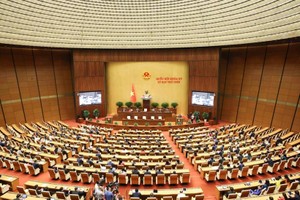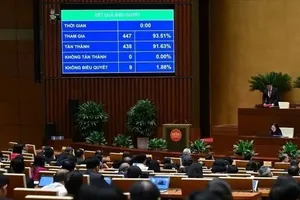Nearly 25 years has gone by since the “doi moi” (renovation) policy was adopted by the Communist Party of Vietnam. The policy is one of the significant milestones in the glorious history of the nation and the Party. Today, whenever mentioning the policy, the Party, Government and people of Vietnam are much obliged to the policy’s initiator and maker: the late General Secretary Truong Chinh.
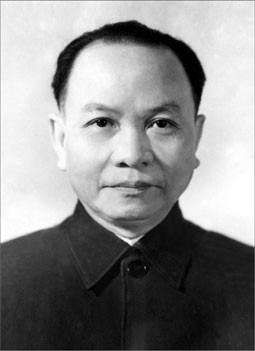
On July 10, 1986, Le Duan, then the Party general secretary, passed away. Four days later, at a special meeting of the Party Central Committee (PCC), former General Secretary Truong Chinh was re-elected to the post he held in 1940-1956.
Political report amended
The year 1986 marked a time when the country fell into a serious socio-economic crisis. The national economy operated sluggishly and inefficiently, failing to satisfy the public’s demand for food, clothing and accommodation. As a result, the social situation became tense and the public’s confidence in the Party’s leadership was undermined, causing concern and worry to many Party members.
Amidst such a situation, General Secretary Truong Chinh and the PCC were making preparation for the sixth Party Congress. The Party’s draft political report was sent to all-level Party organizations for feedback, but that report failed to provide appropriate assessments of the country’s social and economic situation, so it could not satisfy the needs for development of the country.
Former General Secretary Do Muoi once said: “With his sharp reasoning skills, keen thinking ability, and abundant practical experience, comrade Truong Chinh looked at the situation realistically, thought outside the box, and then proposed the Politburo to reconsider a number of important points in the Party’s economic policies.
“He initiated the “doi moi” policy containing a comprehensive content of various key issues, in which renovation of thinking was the first priority. His opinions were highly appreciated by the Politburo and the PCC. As a result, the political report was basically amended based on those opinions.” Presenting the political report at the sixth Party Congress, General Secretary Truong Chinh said: “‘Doi moi’ is an urgent need and even a life-and-death matter to our country.”
The report put forward such mottos as “People-oriented politics,” “Let people know, discuss, exercise, and check important policies of the Party and Government,” “Look at the truth directly, assess the practice correctly, and announce the reality clearly,” and “Reasoning based on facts, respecting objective rules, and acting based on those rules.” All of these slogans have greatly contributed to the implementation of the “doi moi” policy.
The entire Party and people welcomed the report, since it provided new ways for making the best use of the country’s resources and the people’s potential to improve the national economy, get the country out of the crisis, and develop the country under the socialist orientation. The 1986 Party Congress went down to history as the Congress of “doi moi” and a new milestone of the development of the Vietnamese revolution. Since this congress, the country has achieved great outcomes in social and economic development, which were highly valued by many countries in the world.
The late Prime Minister Vo Van Kiet once said: “At that time, 1986, only comrade Truong Chinh, who was a leader with sharp reasoning skills, could successfully conduct the sixth Party Congress, a gathering for ‘doi moi’. Something that was interesting to me was that the ‘author’ of the 'doi moi’ policy was a hardliner like comrade Truong Chinh. He was ready to listen to ideas and opinions from different sources, especially from those who frankly voiced their viewpoints. He constantly struggled with ideas or actions he considered improper and he was willing to accept what he found convincing.”
“Our Party is of the people...”
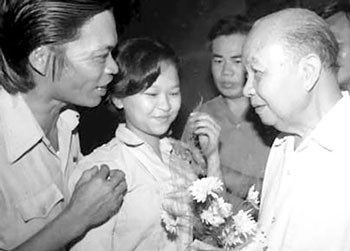
The late Prime Minister also said: “Unlike some other comrades like Le Duan, Nguyen Van Linh and Le Duc Tho, comrade Truong Chinh was not directly engaged in military operations in the South, so he was rather different from those comrades in manner and way of life. Therefore, some Southern cadres were not very intimate with him, although they still respected him. However, all things he did in launching the ‘doi moi’ policy gained him confidence from cadres in the South. As far as I have known, in the period of preparation for the sixth Congress, a number of Southern cadres came to Hanoi to meet comrade Truong Chinh and expressed their wish that he would continue working as General Secretary for one more term”.
President Nguyen Minh Triet, who was once Ho Chi Minh City Party Committee Secretary, recalled: “In that period, despite his old age, comrade Truong Chinh visited the city and some southern provinces more frequently than he did before. His visits to the city were made when the city began to promote the rights of self-management and financial self-control at State-owned enterprises to remove the obstacles caused by the bureaucratic economic management.”
Reviewing his trips to the South, General Secretary Truong Chinh said: “Through those visits, I have understood more about the actual conditions of many cities and provinces, thereby initiating some overall solutions to the development of the whole country…”
Vu Oanh, a former member of the Politburo and former PCC Secretary, said: “Comrade Truong Chinh made excellent contributions to the country’s renovation process. In the political report at the sixth Congress, he pointed out the shortcomings in economic management and set out the important duties of the Party. He said: ‘Our Party is of the people. The people have empowered the Party to lead the country and the Party must not abuse that power. The government must be of the people, by the people, and for the people. The government must practice democracy and publicize all of its policies so that the people can know, discuss, exercise and check them. It was him who initiated the doi moi policy to boost the country’s industrialization and modernization and develop Vietnam into a strong country with wealthy people in an equal, democratic and civilized society.’”
General Mai Chi Tho once said when he was alive: “The Resolution of the sixth Party Congress has remained valid to date. In the document, our Party practiced self-criticism on its mistakes and helped us innovate our thinking, eliminate bureaucracy, and get rid of conservative thought, thereby contributing more to the country’s development.”



